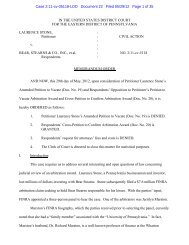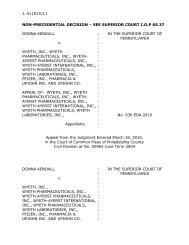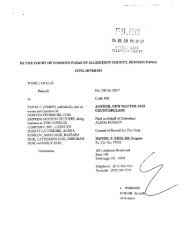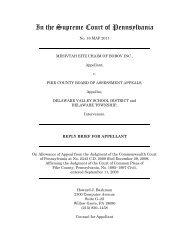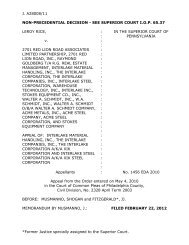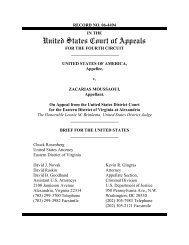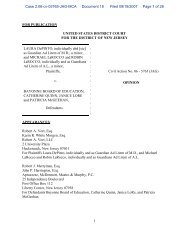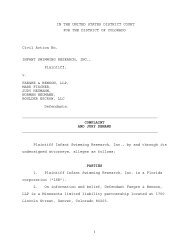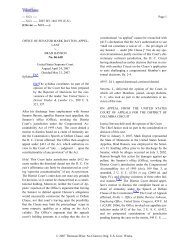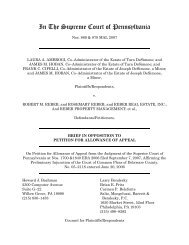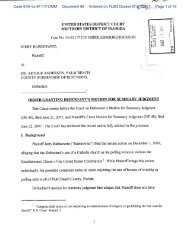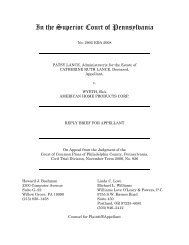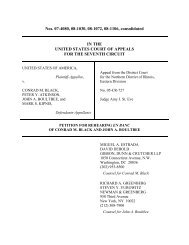In the Superior Court of Pennsylvania - How Appealing
In the Superior Court of Pennsylvania - How Appealing
In the Superior Court of Pennsylvania - How Appealing
You also want an ePaper? Increase the reach of your titles
YUMPU automatically turns print PDFs into web optimized ePapers that Google loves.
I. INTRODUCTION<br />
Plaintiffs/respondents in <strong>the</strong>se 14 cases that <strong>the</strong> <strong>Superior</strong> <strong>Court</strong> <strong>of</strong><br />
<strong>Pennsylvania</strong> consolidated on appeal respectfully submit this answer in opposition<br />
to <strong>the</strong> Petition for Allowance <strong>of</strong> Appeal that defendants Wyeth and Upjohn have<br />
filed.<br />
The Petition for Allowance <strong>of</strong> Appeal fails to fairly portray <strong>the</strong> relevant facts<br />
that give rise to <strong>the</strong> discovery rule issue in <strong>the</strong>se cases and is based on a false<br />
premise. The <strong>Superior</strong> <strong>Court</strong>’s unanimous and carefully reasoned opinion does not<br />
hold that <strong>the</strong> discovery rule will toll <strong>the</strong> running <strong>of</strong> <strong>the</strong> statute <strong>of</strong> limitations in a<br />
prescription drug failure to warn lawsuit until a “definitive causal link” or<br />
“conclusive connection” is established between <strong>the</strong> medication and <strong>the</strong> plaintiff’s<br />
injury. One searches in vain for any such holding in <strong>the</strong> <strong>Superior</strong> <strong>Court</strong>’s opinion,<br />
because it simply is nowhere to be found. Ra<strong>the</strong>r, <strong>the</strong> <strong>Superior</strong> <strong>Court</strong>’s opinion<br />
merely holds, in accordance with well–established <strong>Pennsylvania</strong> law, that even<br />
after a claim has accrued, <strong>the</strong> statute <strong>of</strong> limitations is tolled until a plaintiff<br />
reasonably should have discovered that her injury was caused by <strong>the</strong> negligent<br />
conduct <strong>of</strong> a third–party.<br />
As <strong>the</strong> appellate courts <strong>of</strong> <strong>Pennsylvania</strong> have held time and again,<br />
application <strong>of</strong> <strong>the</strong> “discovery rule” and resolution <strong>of</strong> <strong>the</strong> question <strong>of</strong> reasonable<br />
diligence are fact issues that a jury must decide unless no reasonable person could<br />
disagree over <strong>the</strong>m. <strong>In</strong> accordance with that large body <strong>of</strong> precedent, <strong>the</strong> <strong>Superior</strong><br />
<strong>Court</strong>’s opinion simply holds that <strong>the</strong> trial court erred in resolving <strong>the</strong> discovery



